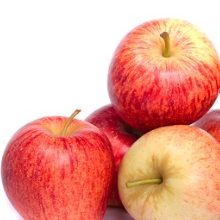Using plant extracts to prevent foodborne diseases
06 November 2019

As infectious disease outbreaks caused by contaminated fruit and vegetables continue to rise, researchers have been searching for a solution in nature. The bacterial pathogens Escherichia coli and Salmonella enterica account for a total of 30% of diarrhoeal outbreaks around the globe. Often, these infections are caused by consumption of contaminated ready-to-eat fruit and vegetables (RTEFV) such as apples or lettuce.
Researchers at Bindura University of Science Education, Zimbabwe, assessed extracts from two plants to determine whether they had antimicrobial properties which could be used as disinfectants of RTEFV.
A research group led by Professor Walter Chingwaru collected extracts from the leaves of the plant Vernonia amygdalina, which is a member of the daisy family, and leaves of the African sour plum tree Ximenia caffra.
To disinfect the apples, the researchers soaked freshly crushed leaves of V. amygdalina in ethanol and used dry leaves of X. caffra with no solvent. The researchers then assessed their antimicrobial potential by using these extracts to treat the skin of apples which had been contaminated with Salmonella and E. coli.
Their results showed that apples treated with V. amygdalina and X. caffra extracts had a 7-log reduction, or 10,000,000 times less E. coli and S. typhi on the fruit surface compared with control apples.
The researchers think that these extracts had antimicrobial effects as they were both found to be rich in alkaloids, tannins and flavonoids which have been found to either kill or restrict the growth of bacteria. The extracts had no effect on the appearance of the skin of the fruit and are not toxic to people.
Lindsay Mudiwa Kasambala will present the research data at the 2019 Federation of Infection Societies Conference (FIS 2019). Her poster (number 147), titled ‘Sanitisation effects of selected medicinal plant extracts against Escherichia coli O157:H7 and Salmonella enterica subsp. enterica (Serovar Typhi) on Malus pumila Mill. fruit surfaces’ will be available to view during the evening of Tuesday 12 November.
Hosted by the Microbiology Society, FIS 2019 will take place between the 11–14 November 2019 and is a unique conference which includes the collaboration of 16 societies across the UK, with interests in different aspects of infectious diseases, clinical microbiology, biomedical science and infection control and provides a great opportunity to find out about the latest developments and to connect with key contacts and networks.
Image: iStock/membio.


